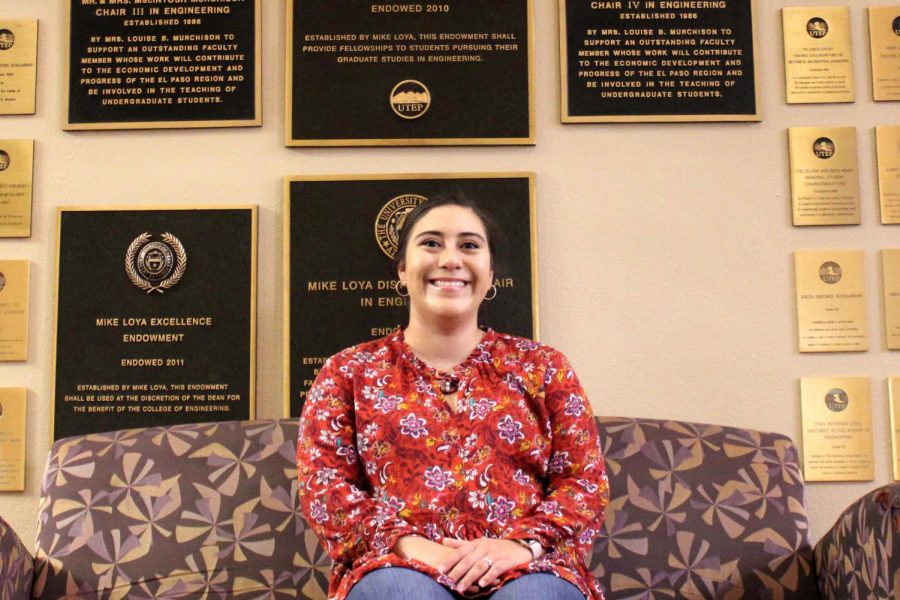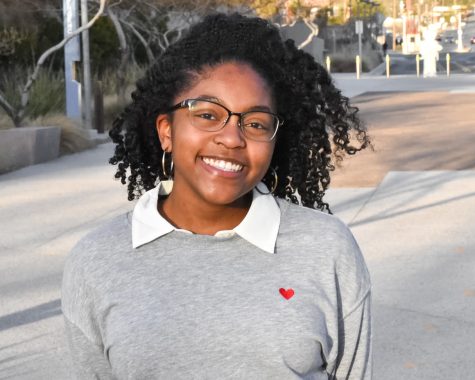Senior Aibhlin Esparza is blazing a trail for women in engineering.
“I’m one of the people where, if there’s an opportunity in front of me, I’m gonna go ahead and take it. I’ll work out the rest of the details later,” she said. “I think it’s important to show other people that you can accomplish all things. Being a woman in engineering, sometimes it is difficult, but I know that if I’m the first to do something, that’ll start a ripple effect and more women will join the movement.”
Esparza, who is majoring in mechanical engineering, has accomplished many things. During her past summers, Esparza tracked the brain’s blood flow at UT Arlington, studied the progression of ALS in fruit flies at the University of Arizona, developed and monitored scaffolding for cancer cells at UTEP and also developed a new radar design for space and airborne systems at the Raytheon Company.
Her current project, a prosthetic liner that monitors humidity, temperature and alignment for amputees, is almost complete.
Esparza just came back from a two-week study abroad trip at Brazil designing carts to carry recyclables for the locals there.
None of this would have happened if Esparza hadn’t attended a scholarship workshop back at her high school in 2016.
“I really didn’t know that it was a scholarship workshop. I showed up with open ears and an open mind,” Esparza said. “I stood there, I got the flyer, then a couple of weeks later, the deadline was coming up and I thought, ‘Why not try?’”
Esparza was later granted two full-ride scholarships, one from the Gates Millennium Scholars Program and a second from the Terry Foundation.
“When I found out that I was a (Terry) finalist, everything kind of shifted. It wasn’t a, ‘Maybe I’ll go to college, maybe I’ll work, maybe I’ll put it off for a couple of years.’ It was like ‘No, you’re gonna go and you’re gonna make a way for this to happen.’ I think, from then on, I kind of developed this sense of ownership of my education. I think that has really driven me forward,” Esparza said. “Having that flexibility and knowing that I have funding for graduate school is what really has me thinking ‘Yes. I need to keep this at all costs.’”
Esparza is the first to go to college on both her mother’s and father’s side and it is something that fuels her.
“My parents really wanted me and my siblings to do the things that they couldn’t do growing up. Education was not number one for them, they had to go straight into work,” she said. “They had to postpone a lot of the goals and the things that they wanted to get around to doing.”
Later, Esparza’s engineering work led her to intern at Raytheon, a “technology and innovation leader specializing in defense, civil government and cyber-security solutions,” according to its website.
The company’s influence is large. It began in the 1920s when they created a piece that allowed radios and microwaves to be less expensive and more accessible to the public. The company also created the computer that guided the Apollo 11 to the moon in the 1960s.
The company has already offered Esparza a position with them.
“They extended a full-time offer as a system engineer. I’m also applying to graduate school right now,” Esparza said. “My goals at Raytheon are to become a program manager and a principal engineer. Hopefully, moving up the scale, I’d like to implement some biotechnology because there is a lot of clients that we work with that could use that. I’m hoping to kind of change what they’re doing right now to something a lot bigger.”
While working at Raytheon, Esparza hopes to continue her education at the University of Arizona.
“What I liked about that university was that they actually had a clinic where ALS patients go get different equipment and they also help with physical therapy,” she said. “We were in the lab working on the molecular stuff and there’s people out there working with patients. It’s full circle.”
While Esparza’s time at UTEP is ending, she encourages other students to become active on campus.
“I think a lot of people go to class and they leave, but once you start getting involved in college, you learn that there is so much more college offers,” she said. “I think the SELC is amazing … Most importantly, I think it’s your professors. Your professors are the ones who can guide you to specific labs to work in, student employment and maybe they have an opening for you to work in their lab or their office. That’s one thing we really neglect as students. All you have to do is talk to them.”
Exodis Ward may be reached at [email protected]












